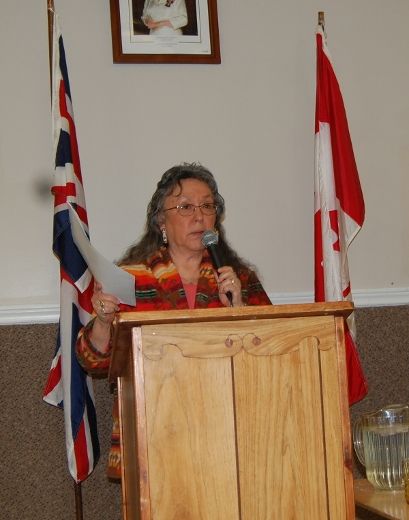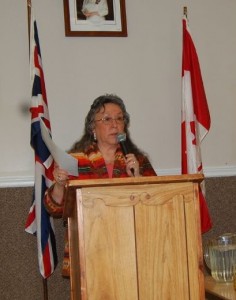Preserve and protect was message from Band office manager


After fears that vehicles would be driving along Ipperwash Beach this summer, an agreement has been reached between local officials, community members and First Nations to temporarily ban traffic on the beach.
The agreement was hammered out last Tuesday and will be in effect throughout the summer.
Negotiations are continuing to find a long-term solution after members of the Kettle and Stony Point First Nations made a bid to reclaim the land by removing barricades.
The First Nations said they removed the municipal barricades to reconnect the trail that historically linked the Kettle and Stony Point Nations.
On Sunday, more than 150 gathered at the Port Franks Community Centre to hear about the update. Mark Lindsey, an executive member of the Centre Ipperwash Community Association introduced Lorraine George, the manager and CEO of the Kettle Stony Point band to explain where the band was in the talks with Lambton Shores and other aboriginal agencies.
She said there are common interests with the band and the beach home owners and agreed that at least for one year there would be no vehicle traffic on the beach. She could not guarantee this would be a permanent arrangement.
George said she was glad to hear there will be historic signs erected that talk about not only the First Nation history but also the background of Ipperwash including the casino dance hall that once stood on this beach. She went back to her childhood at Stoney Point and stories her father, the late Cliff George told her about the trails.
One was a forested area, which some people still use, from Kettle Point to Stony Point and the other one is along the beach; a walking trail that would have come before cars. She said the two neighbours needed to understand and education build – respecting each other.
She announced that yes, the cottage owners did own to the waters edge by title and she did not realize this piece of beach was crown reservation, meaning the guarantee the public has always used the beach and that would never change. “Put your fears to rest, we are not trying to claim your land,” she said. She said she learned at their fact finding meeting there is a piece of land that does not seem to have a owner. “Does the crown own this? Do the property owners own this? CICA should be investigating that.
Having said that,she continued, “Chief Bressette has no intention of claiming your personal property, but that Aboriginal Title meant the First Nations always have the right to hunt and fish. We have that right,”she said referring to Aboriginal Title. George then went back to the history of the Huron Tract that goes from Walpole to north of Goderich that later became treaties under the Canada Company, “Treaties that say you can’t sell Indian land.” That, she explained is what happened and the
First Nation people were not consulted when over the years, their land was sold off. “We don’t want to hurt anyone, we just want to right wrongs,” she said.
The next concern was natural environment and George said the First Nation work with conservation authorities in regards to species at risk, phragmites and that the natural environment and that they all need to work together to protect and
preserve so everyone can use the land.
THE BARRICADES
George said in 1967 the Kettle Stony point band council passed a bylaw managing the
beach front with a control of use of beach use and fees-the same concerns of today. The by-law talked about washrooms and change rooms but before the plan was implemented, the storm of 1972 came through the region causing much damage and the barricades went up because of the safety issue. She said, in her opinion, those barriers were supposed
to be temporary and the band was never consulted with this action.
In a London Free Press article April 10, 1972, MPP of the day Lorne Henderson said parking and driving on the beach at Ipperwash would be banned under a scheme for redevelopment. It was an Ministry of
Natural Resources plan that called for seven new parking lots a half-mile from the beach. Four comfort stations were also in the plan that was to be phased in over three years. The first phase of the project was to cost $400,000. The province would bear the cost of constructing a new road behind the seven parking lots and Bosanquet Township and Lambton County would pay the price to acquire the land. The ban on the beach was to take permanent effect that summer.
George said, “Not to judge, but as fact, there were signs on the barricades that said ‘No Indians allowed’.” She said the sign was later removed by the OPP and MNR. “We had no consultation of those barriers going up, hopefully we have learned from that time,” she said adding the cultural heritage centre proposed to go in the Ipperwash Park will be an education centre, open to the public and many carefully placed trails will also be in the park.
George said Chief Bressette and Lambton Shores mayor Bill Weber got together to discuss how the two neighbours could work out a mutual agreement and that this year there would be only foot access
on the beach as “they continue to work on their vision.
Although there was no time permitted for questions, CICA vice chair Gerry Rupke asked George for clarification regarding their strategic plan vision included vehicles on the beach in the future and she said vehicles on the beach could be part of their strategic plan.
Rupke said Aboriginal Title only applied to land never ceded and the treaty for Kettle Stony Point- Treaty 29 was ceded. She answered that many of the
treaties were not done properly and that it is her belief their treaty is pre-confederation and their land was not ceded.
Brent Shea representing CICA told people to keep writing letters to the government officials. He said the agreement reached last week was the beginning, not the end and there was still a lot of work to do.
Karen Alexander from Lake Huron Centre for Coastal Conservation spoke briefly about the scientific facts that surround repercussions when vehicles are allowed on beaches.
After the meeting people were invited to take their questions to individual sources, and Richard Houston who owns two cottages, one from 1911 asked Weber what kind of barriers would be erected. Weber said that although that has not yet been discussed at the meetings, control measures will be part of their upcoming talks, but he said they do want more aesthetically pleasing controls.
CICA member Mark Lindsey said he hoped they could find a way to move forward and that not having the stresses of vehicles on the beach this summer would give the working group time to come up with long term solutions.
Weber told the Lakeshore Advance although they realize this (no vehicles on the beach) is not a permanent solution with the ongoing efforts of the working group and the community, they can build relationships and market the area for future use and growth. ” We need to do this right showing cultural and economic diversity.”
The working group, made up of representatives from Aboriginal Affairs, Lambton Shores, Kettle and Stony Point as well as the Centre Ipperwash Community Association met again in London earlier this week, and have three scheduled meetings committed to achieve the target of April 30th for finalizing a common plan for beach focused on protecting and promoting recreational, historical, and environmental features of the area.
